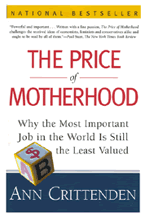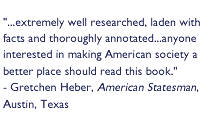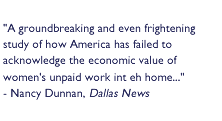 |
 Interview
with the author about her book: The Price of
Motherhood
Interview
with the author about her book: The Price of
Motherhood
|
 |
 What
made you decide to write this book?
What
made you decide to write this book?
By the time I had a child, I had already
had a successful career in journalism,
as a reporter for Fortune, as a writer
and foreign correspondent for Newsweek,
and as an economic reporter for The
New York Times. Becoming a mother struck
me as both the most important and most
challenging job I had ever had. I think
many professional women tend to have
that reaction they take their job as
a mother as seriously as they take the
other jobs they have had. Yet they discover
that our society, despite the lip service
paid to motherhood, doesn’t seem
to agree. I was shocked at the lack
of respect, status, and economic independence
that go with being a conscientious parent.
A few years after I left my job at the
Times, I ran into someone at a party
who said, "Didn’t you used
to be Ann Crittenden?" That’s
when I knew I had to write this book.
 So your first point is that
raising children is important, highly
skilled work?
So your first point is that
raising children is important, highly
skilled work?
Absolutely. As the book explains,
child-rearing calls on the same qualities
that characterize the best teachers,
psychologists, coaches, ministers.
And the work produces more wealth
than any other job in the economy.
Economists used to believe that national
wealth came from three factors: land,
labor, and capital. Now they reccognize
that human capital, or human knowledge,
skills, and entrepreneurship, are
more important than all others put
together. What is still not acknowledged,
by economists or the society, is that
most human capital is created by mothers
and other early teachers and caregivers.
Mothers are the most valuable producers
in the entire economy. Yet what they
do is not even considered work at
all.
 What
are the most shocking things a new
mother is likely to discover when
she has a child? What is likely to
surprise her the most?
What
are the most shocking things a new
mother is likely to discover when
she has a child? What is likely to
surprise her the most?
I think the first thing is how much
time as well as money a child requires,
and how time and money are interchangable.
Many women without children think
they can have a kid and continue more
or less as before, after a brief maternity
leave. But then they have the "I
had no idea" reaction. They have
no idea that they will fall in love
with that baby, and that it will become
the focus of their universe.
But this very good thing for human
cultureæa mother’s desire
to nurtureæis turned into a
very bad thing for women. Many women
discover that they either have to
go back to word full time right away,
and leave their baby behind, or quit
or shift to a less demanding schedule,
and leave their dreams and ambitions
behind. Even the most highly educated,
"modern" women may be surprised
to discover that having a baby throws
them back into economic dependency
on their husbands. In the book I describe
how maternal dependency is the dark
little secret of family life. The
typical college educated mother in
America loses roughly one million
dollars in a lifetime earnings after
having one child.
 But
don’t modern women choose to
become mothers, and therefore choose
the trade-offs that with motherhood?
But
don’t modern women choose to
become mothers, and therefore choose
the trade-offs that with motherhood?
First, as the book points out, the penalties
on American mothers are now so high
that many women decide not to have kids
at all. Childlessness among educated
American women is now higher than it
has been since the turn of the 20th
century.
Secondly, women definitely do not choose
the financial consequences of motherhood
in America. Motherhood is now the single
greatest risk factor for poverty among
American women. That is not by women’s
choice it’s the choice of employers,
of government, of unequal marriage laws
and judges. In no other county is motherhood
such a threat to a woman’s financial
well-being.
 Why is a mother’s financial
security more at risk than a father’s?
Why is a mother’s financial
security more at risk than a father’s?
Take old age. I recently got in the
mail an estimate of my future Social
Security, and there were all these
zeros for the years I spent primarily
caring for my child. A nanny gets
Social Security credits, but mothers
don’t, even though the workers
they produce pay for everyone’s
Social Security. This costs women
hundreds of dollars a month in individual
pensions.
Or take divorce. One thing I discovered
during my research is that a person
earns no credit in marriage for being
the parent who cares for the kids
and the home. The parent who does
this can’t count on any compensation
for her financial sacrifices for the
sake of the family. In the vast majority
of states, a mother can’t even
count on receiving half the family’s
assets, if there are significant assets.
Marriage is still not an equal partnership.
This is why the care-giving partner,
even in middle and upper middle income
families, is often impoverished by
divorce. I tell the story of one corporate
lawyer with two young children who
almost had to go on welfare. One-third
to one-half of all divorced women
do.
 Are
you suggesting that mothers should
be paid? Are
you suggesting that mothers should
be paid?
I’m saying that their work, which
creates enormous material wealth,
should receive some material recognition.
I’m saying that caring for dependents
æ the traditional female service
for society æ is at least as
important as soldiering æ the
traditional male service to society.
We lavish huge benefits on soldiers,
and impose huge penalties on caregivers.
This amounts to gender discrimination.
As things now stand, our country is
free riding on the unpaid or cheap
labor of women.
 But
isn’t caring for one’s child
a labor of love? Isn’t virtue
its own reward? But
isn’t caring for one’s child
a labor of love? Isn’t virtue
its own reward?
I haven’t found that virtue will
pay the rent or satisfy the supermarket.
Nor is maternal self-sacrifice good
for children. One of the most interesting
things I discovered is that in countries
where mothers are relatively secure
financially, they actually spend more
time with their children.
 What are the most controversial
findings in the book?
What are the most controversial
findings in the book?
I discovered, to my surprise, that
mothers are clearly more willing to
spend family income on children than
fathers are. This is a powerful finding
that cuts across all cultures. It
is also universally true that the
more education a woman has, the more
time she is likely to devote to her
children. This means that "women’s
liberation" is the best thing
that has ever happened to children.
The people who argue that mothers
should subordinate their own interests
and autonomy "for the sake of
the kids" have it exactly backwards.
 What
can be done to improve the situation
of mothers?
What
can be done to improve the situation
of mothers?
Read the book! I have lots of ideas
on how we can bring children up without
putting women down. The big point is
that women who chose to be mothers can
and should be the respected equal of
any other worker, rather than defined
as "dependents." As I explain
in the book, the first American feminists
tried to achieve this goal, but they
were defeated. It’s time to finish
the job.

More
about the book:
About
the Book
What You Didn't Know
In Conversation
with Ann
Press
Release
Reader
Response
|
|
 |
|
|
|
 |

More about the book:
About
the Book
What You Didn't Know
In Conversation with Ann
Press Release
Reader Response



|

